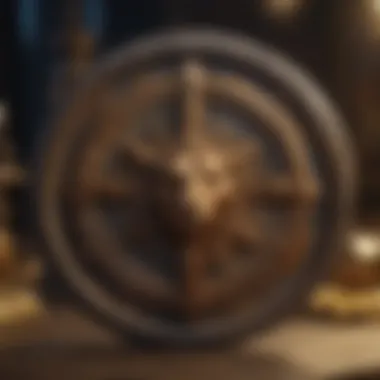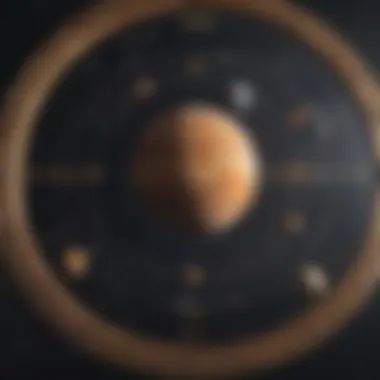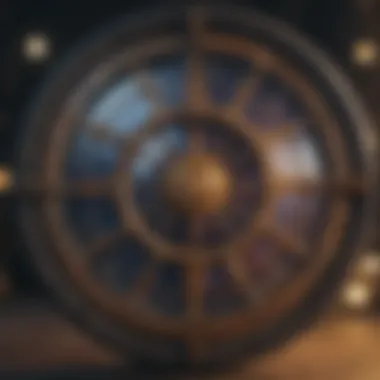Methods for Effective Horoscope Matching in Astrology


Intro
Horoscope matching is more than just a pastime in the world of astrology; it’s a significant tool for understanding the compatibility between individuals. This process is steeped in ancient traditions and is often regarded as a map that guides relationships. In various cultures, especially those influenced by Vedic astrology, horoscope matching plays a vital role in marriage and partnership decisions. As we navigate the complex waters of human connections, understanding how astrology can inform our choices can provide a clearer vision.
Astrology itself is a vast domain; diving into it requires a grasp of its fundamentals. Whether you’re an astrologer looking to refine your skills or a curious individual seeking insights into your relationship dynamics, exploring the methods of horoscope matching can illuminate several facets of compatibility. This article aims to dissect the critical elements involved in horoscope matching, offering both foundational knowledge and practical applications.
The relevance of this subject is becoming increasingly apparent as more people turn to astrology for guidance in their personal lives. With the right knowledge at hand, one can navigate the realms of love and partnership with a discerning eye. This exploration will encompass essential astrological concepts, delve into the intricacies of zodiac signs, and evaluate how celestial events can shape compatibility. Let’s embark on this enlightening journey together.
Understanding Horoscope Matching
Horoscope matching is not merely a fleeting trend within the vast realm of astrology; it’s a timeless practice rooted in various cultures, often seen as an invaluable tool for guiding personal relationships. The significance of this topic in the context of modern relationships cannot be overstated. Whether one is a seasoned astrologer or a curious novice, understanding how horoscope matching operates can lead to deeper insights into compatibility and interpersonal dynamics.
Definition of Horoscope Matching
At its core, horoscope matching refers to the analysis of two individuals' astrological charts to gauge their compatibility. This practice typically considers numerous factors from both parties’ birth details – think of it as assembling a jigsaw puzzle where the pieces represent various astrological elements. These elements include zodiac signs, planetary positions, and even the aspects formed between planets in each chart.
In essence, horoscope matching acts as a cosmic blueprint, suggesting how harmonious or tumultuous a relationship might be. It provides a synthesized view of potential strengths and weaknesses, allowing individuals to make informed decisions about their partnerships before they get too deep into them.
Importance of Compatibility Analysis
Astrological compatibility is more than just determining if two people 'get along'; it explores the intricate interplay of energies at work. Compatibility analysis plays a crucial role in decisions ranging from marriage to professional partnerships, shaping expectations and fostering understanding.
- Enhanced understanding: Compatibility analysis serves as a guide, helping individuals navigate their relationships with a clearer perspective. Knowledge of potential areas of conflict empowers partners to proactively address them rather than wait for issues to arise.
- Conflict resolution: Knowing each other’s astrological predispositions can be an eye-opener. For instance, a fiery Aries might clash with a more reserved Capricorn. By recognizing these tendencies, partners can strategize on how to balance their differences, leading to smoother conflict resolution.
- Long-term Insights: Those considering serious commitments often turn to compatibility analyses. Insights gained from the horoscope matching process can shed light on long-term compatibility, thereby influencing life decisions that range from cohabitation to child-rearing.
Historical Context of Horoscope Matching
Horoscope matching is deeply intertwined with cultural traditions spanning millennia. Different cultures interpret and utilize astrological principles in unique ways.
- Vedic Astrology: In many Eastern traditions, particularly within Indian astrology, matchmaking is prevalent. The ancient practice of Kundli matching (birth chart comparison) is paramount in determining auspicious timings and compatibility within marriages.
- Western Astrology: Meanwhile, in the West, horoscope matching is more commonly appreciated for personal insights rather than as a prescriptive tool. Historically, people consulted astrologers for advice on potential partners, linking celestial movements to personal affairs.
The evolution of this practice highlights its enduring relevance, adapting with changing societal norms and attitudes while retaining its core principles. Keeping a historical lens on horoscope matching allows contemporary practitioners to appreciate its longevity and resilience in human relationships.
"As we delve into the intricacies of horoscope matching, we uncover not merely the mechanics of astrology but the very essence of human connections, woven through time and space."
In summary, understanding horoscope matching is essential for anyone looking to study or utilize astrological compatibility. By grasping its definition, importance, and historical depth, individuals can appreciate this sophisticated tool and leverage it for enriching their personal and relational journeys.
Astrological Components in Compatibility
When we delve into the world of horoscope matching, it becomes evident that astrological components form the bedrock of understanding compatibility. Various elements, from celestial bodies to elemental associations, weave together a tapestry of insights. Recognizing these aspects not only enhances one’s ability to assess relationships but also lends a richer comprehension of one's personal dynamics.
Zodiac Signs and Their Characteristics
Zodiac signs aren’t just symbols; they embody distinct energies and traits that can significantly influence personality. For instance, an Aries may exhibit boldness and a go-getter attitude, while a Cancer might lean toward sensitivity and nurturing behavior. This exchange reveals a crucial insight—certain combinations foster harmony, while others may spark friction.
Considerations in Zodiac Characteristics:
- Strengths and Weaknesses: Balancing these attributes in a relationship can promote growth. If a Taurus’s stubbornness clashes with a Sagittarius's need for freedom, neither partner might feel seen or heard.
- Elemental Connection: Each sign is part of one of four elements—fire, earth, air, or water—which in turn shapes interaction styles. Fire signs often thrive on excitement, while earth signs may prioritize stability.
Understanding these patterns provides a guide for potential compatibility. It nudges individuals to be aware of their partner's inherent tendencies and work towards mutual respect.
Planets: Their Roles and Influences


The influence of planets extends far beyond mere symbolism in astrology. Each planet is tied to specific traits and realms of life, from emotions to intellect. For example, Venus governs love and attraction, while Mars speaks to ambition and aggression. Ignoring these planetary roles can lead to an incomplete assessment of compatibility.
Key Planetary Influences:
- Moon Influence: The Moon's position in both partners' charts can reveal emotional compatibility, highlighting how each person expresses their feelings. If one partner’s Moon in Capricorn faces another partner's Moon in Gemini, navigating emotional waters might require effort and negotiation.
- Mars and Venus Dynamics: The interplay of these two planets, with Mars representing drive and Venus representing affection, can create attraction or friction. Their placement often tells a story of how each partner articulates love and desire.
Understanding the positions and interactions of these planets offers a comprehensive picture of how couples can synergize their energies.
Elemental Associations and Their Impact
Astrology classifies signs into four major elements: fire, earth, air, and water. Each element reflects a fundamental personality type, greatly affecting relationships. It provides key insights into how individuals relate through communication styles, desires, and even how they handle conflicts.
Elemental Dynamics in Relationships:
- Fire Signs (Aries, Leo, Sagittarius): Tend to be passionate and spontaneous, sometimes leading to impulsive decisions.
- Earth Signs (Taurus, Virgo, Capricorn): Grounded and practical, often providing stability in emotional situations.
- Air Signs (Gemini, Libra, Aquarius): Value intellectual connection and communication, thriving in partnerships that emphasize dialogue.
- Water Signs (Cancer, Scorpio, Pisces): Deeply emotional and intuitive, these signs often seek profound emotional bonds and understanding.
The Processes of Horoscope Matching
The realm of horoscope matching involves methods that intertwine various facets of astrology, and understanding these processes is pivotal for ensuring a comprehensive analysis of relational compatibility. Several distinct methods exist, each offering unique insights into how two individuals may interact on emotional, intellectual, and spiritual levels. Grasping these processes enables astrologers and those passionate about astrology to interpret birth charts and engage in meaningful assessments of compatibility with clarity and precision. This article will explore key components of these processes, emphasizing their significance in guiding decisions related to relationships.
Birth Chart Analysis Fundamentals
At the core of horoscope matching lies the analysis of birth charts, which are essentially maps that depict the positions of celestial bodies at the moment of a person’s birth. This analysis serves as a foundational element, as it provides insights into an individual’s personality traits, emotional tendencies, and overall disposition. When analyzing a birth chart, consider the following elements:
- Sun Sign: Represents the core identity and ego, crucial in determining individual motivations.
- Moon Sign: Reflects emotional responses and instincts, revealing how one funds comfort and security.
- Rising Sign (Ascendant): This indicates how others perceive the individual, shedding light on interpersonal dynamics.
- Planetary Aspects: Examining the relationships between planets gives insight into the complexities of character and interactions.
The birth chart analysis is not merely about identifying traits; it's about unraveling the energetic dynamics between two charts to establish how these energies will interact. Grasping these fundamentals can yield profound understanding of a person's nature and their compatibility with another person.
Synastry: Overlaying Birth Charts
Synastry is an advanced technique that involves layering the birth charts of two individuals to analyze their combined astrological influences. This method is a bit like mingling two complex recipes to see what flavors emerge when combined. The examination focuses on how the planets in one chart interact with those in another chart, highlighting compatibility or potential friction.
Key aspects to analyze during synastry include:
- Conjunctions: When planets align closely, the energies fuse, indicating strong connections.
- Oppositions: These can create tension but may also provide balance, reflecting areas where partners can learn from each other.
- Trines and Sextiles: Represent harmonious relationships that foster easy communication and support.
- Squares: Suggest challenges that can lead to growth, though they may be uncomfortable.
Synastry helps pinpoint both strengths and vulnerabilities within a relationship, revealing where partners can harmonize effortlessly or where they might need to navigate difficulties with care.
Compatibility Reports: What They Include
A compatibility report synthesizes the insights derived from both individual birth chart analyses and synastry evaluations. These reports are often tailored to meet the needs of the clients, yet typically encompass several essential elements, such as:
- Personal Traits Analysis: A discussion of the intrinsic characteristics of each individual, based on their charts.
- Emotional Compatibility: Insights into how each person is likely to respond in a relationship, highlighting potential emotional conflicts or strengths.
- Communication Styles: Understanding each individual's preferred ways of relating can help anticipate misunderstandings.
- Long-Term Outlook: Assessment of how well the couple may function together over time, based on astrological patterns.
A well-constructed compatibility report is not just about stating whether two people are 'compatible' or 'incompatible.' It dives deep into the layers and textures of their bond, providing nuanced insights that are invaluable for personal growth and relationship management.
Practical Considerations in Horoscope Matching
Understanding the practical aspects of horoscope matching can enhance one's journey into astrology. While the core principles serve as a foundation, the nitty-gritty elements that come into play can make all the difference in the practice. Each individual's context, cultural background, and even personal experiences shape how they perceive and utilize horoscope matching. By delving into these practical considerations, one can gain deeper insights into relationships and how their astral alignments affect compatibility.
Cultural Variations in Astrological Practices


Astrology is not a monolithic field. Different cultures bring unique flavors to horoscope matching, resulting in varied interpretations and techniques. For instance, in Vedic astrology, which originates from India, practitioners often emphasize the positions of the Moon rather than solely focusing on Sun signs. This is significant, as the Moon's placement can reveal subtler emotional dynamics in a relationship.
Conversely, Western astrology often prioritizes Sun signs and their associated elements, focusing on personality traits derived from one's zodiac sign. Cultural beliefs also shape people's trust in astrology. In some cultures, astrology is deeply woven into everyday life, guiding decisions from marriage to career, whereas in others, it's seen as mere entertainment. Recognizing these cultural underpinnings can help astrologers better understand their clients' perspectives, leading to more nuanced compatibility assessments.
The Role of Intuition in Compatibility Assessments
While analytical methods form the backbone of horoscope matching, intuition plays an equally pivotal role. Astrologers often find themselves relying on gut feelings when interpreting charts. These instincts can stem from years of experience or simply a heightened sensitivity to the energies present in a birth chart. It’s said that to truly grasp the energetic interplay between individuals, an astrological reading shouldn’t just be mechanical.
For instance, taking two birth charts and simply comparing planetary positions can miss the overall atmosphere or feeling that underpins their compatibility. An intuitive approach might reveal unspoken issues or strengths, which analysis alone may not capture. Thus, the marriage of intuition and method leads to a holistic understanding, elevating the compatibility reading from mere calculation to a meaningful exploration of relationship dynamics.
Common Misconceptions about Horoscope Matching
With the rise of astrology in popular culture, numerous misconceptions about horoscope matching have emerged. For one, many people assume that compatibility can be determined solely by Sun signs. While Sun signs offer a glimpse into general characteristics, true compatibility involves a plethora of factors, including Moon signs, rising signs, and the broader context of planetary placements.
Another prevalent myth is that astrology guarantees relationship success or failure. Horoscope matching should not be seen as a definitive guide, but rather as one of many tools to increase understanding. It’s about perspective—approaching relationships informed but not prescribed.
In addition, some believe that if a couple's charts appear incompatible, the relationship is doomed. Yet, astrology doesn’t merely predict outcomes; it offers insight into potential challenges and strengths, informing how partners might navigate their unique dynamics.
"Astrology is not fate; it’s a mirror reflecting our potential, it’s up to us to choose how we respond to it."
By demystifying these misconceptions, individuals can approach horoscope matching with a clearer, more informed mindset, ultimately leading to healthier relationships.
Integrating Horoscope Matching into Daily Life
Integrating horoscope matching into daily life serves more than just a spiritual or mystical purpose. It's an avenue for individuals to gain insights into their personal relationships, behavior patterns, and life choices. The art of compatibility analysis can affect how we navigate the complex dynamics of our interactions, particularly in romantic relationships. By incorporating astrological insights into daily practices, one might find themselves better equipped to understand their partner's needs and idiosyncrasies.
Astrology, as a guiding principle, allows individuals to decipher their emotional triggers, communication styles, and compatibility with others. This understanding can cultivate a nurturing environment in relationships. When partners recognize and respect each other’s astrological traits, it can enhance mutual acceptance and reduce unnecessary conflicts. It’s about elevating the conversation beyond the surface level and addressing deeper emotional and psychological undercurrents that traditionally lead to discord.
Using Astrology for Relationship Insights
Astrology lends itself well to relationship analysis. It is not merely about checking a couple's sun signs but involves a more nuanced approach. Here’s how one can use astrology for relationship insights:
- Birth Chart Comparisons: Looking into each partner’s natal chart can reveal strengths and weaknesses that may not be obvious at first glance. For example, a person with a strong Moon in their chart may require a partner who is sensitive and emotionally available.
- Synastry: This involves overlaying two natal charts to see how they interact. For instance, if one partner's Venus aligns favorably with the other's Mars, it may indicate a strong attraction, but challenging aspects might hint at potential friction.
- Transits and Progressions: Current astrological transits affecting each partner’s chart can illuminate timings when relationship challenges might arise or potential for growth.
These facets can guide individuals in their interactions, decisions, and overall relationship dynamics.
Astrological Timing: When to Seek Advice
Knowing when to seek astrological insights is crucial. Timing in astrology can greatly enhance one's understanding of relationship dynamics. Here are some moments when it's especially beneficial:
- During Major Life Changes: Consider seeking astrological guidance before making significant decisions, like moving or changing careers, as these can impact personal relationships profoundly.
- Before Important Events: Planning marital events or milestones? Timing can be key, and consulting astrological calendars can help ensure auspicious dates.
- In Times of Conflict: If a relationship is experiencing turbulence, it might be the right time to delve into astrological insights to find underlying causes.
Astrological timing can act as a compass, guiding you through life’s unpredictable waters.
Balancing Astrology with Personal Experiences
While astrology offers valuable insights, it's paramount to remember the balance between astrological influences and individual personal experiences. Every person is unique, shaped by their life experiences, beliefs, and social environments. Integrating both astrological analysis and personal understanding can lead to more authentic interactions.
- Trust Your Gut: While stars can guide, it is crucial to listen to your intuition. If something doesn’t feel right, irrespective of what the chart suggests, it’s worth exploring those feelings further.
- Personal Growth: Astrological insights should be seen as tools for personal and relational growth rather than rigid rules to follow. For example, just because a chart indicates certain weaknesses doesn’t mean one cannot work through them.
- Seek Diverse Perspectives: Engaging with other individuals—astrologers, therapists, or trusted friends—can provide different viewpoints that enhance understanding.
"Understanding one's astrological influences is insightful, but lived experiences teach the lessons worth learning."


Advanced Topics in Horoscope Matching
Astrology is often seen as a mere tool for gaining insights into relationships, but diving deeper unveils a plethora of advanced topics that elevate its practice. Understanding these topics is vital for astrologers, tarologists, and esotericists who seek deeper meaning in compatibility analysis.
The significance of advanced topics stems from the intricate layers of astrology itself. It does not only imply matching sun signs. For anyone serious about practicing astrology, grasping the nuances of compatibility can mean the difference between a superficial understanding and a profound insight that enhances relational dynamics.
The Astrology of Marriage: What to Consider
When it comes to marriage, astrology holds a place of paramount importance. Couples often wonder which planetary positions align to foster a thriving partnership. Several crucial elements come into play here:
- Essence of Natal Charts: Analyzing the individual natal charts for both partners gives insight into their core personalities. For instance, Venus and Mars positions can indicate how affection and desire are expressed.
- Compatibility of the 7th House: This house governs partnerships. Its aspects between partners can reveal potential challenges and strengths within the marriage.
- Dasha Periods: The running Dasha periods of each partner can influence the timing of significant life events, including marriage. Taking these periods into account can help ascertain when the relationship might flourish or face trials.
The stars may guide, but the choices made in love define the journey.
Long-Distance Relationships through Astrology
Long-distance relationships often encounter unique challenges. Astrology can offer a framework to navigate these waters by analyzing:
- Synastry: Understanding how the partners' charts interact can provide clarity on emotional and communicative strengths, helping to bridge the distance.
- Transits and Progressions: Keeping track of current planetary movements can give insights into how these might affect the relationship's dynamics over time.
- Elemental Balance: Noticing elemental imbalances between partners can illustrate areas of friction, be it emotionally or practically. For example, if one partner is predominantly earth and the other air, different needs for stability versus change may emerge.
Role of Astrologers in Compatibility Analysis
The insights provided by skilled astrologers can be invaluable in the world of compatibility analysis. Here's what to consider:
- Expert Interpretation: Astrologers not only read charts but also interpret the nuances that may escape untrained eyes. They can follow complex patterns and transits to guide individuals on what they might expect.
- Ethical Considerations: Understanding the ethical dimensions of suggesting compatibility analysis is crucial. Providing sound advice while respecting clients’ individual choices is foundational in astrology.
- Personalization of Charts: Every relationship is unique. A seasoned astrologer customizes analysis based on both partners’ personal experiences, rather than relying solely on general compatibility cues.
Future of Horoscope Matching
As we turn the page to the future of horoscope matching, it’s crucial to take a step back and reflect on how this age-old practice is evolving alongside modern society. Our understanding of relationships is shifting, and so is the role astrology plays in them. The discussion around the future signifies not just advancements in technology but also a metamorphosis in societal attitudes toward compatibility.
The trends suggest a growing appeal of astrology in mainstream culture. With that mainstream acceptance, horoscope matching becomes not merely a personal endeavor but a cultural phenomenon, influencing how people approach relationships. This could lead to a more nuanced understanding of compatibility that's deeply enriched by astrological insights and modern relationship dynamics.
Technological Advances in Astrology
The intersection of technology and astrology is an exhilarating topic. With the rise of apps and online platforms, analyzing compatibility has taken on a new form. Several technology startups are innovating ways to automate horoscope matching, often providing interfaces that users can easily navigate.
Key technologies include:
- Astrological Software: Programs that analyze vast astrological databases to generate compatibility reports in seconds, offering insights that used to take hours to figure out by hand.
- Mobile Applications: Many applications now give users daily horoscopes, relationship compatibility widgets, and notifications about cosmic events that can influence relationships.
- AI and Machine Learning: Some platforms employ AI algorithms to derive more personalized insights based on user behavior and feedback, adapting to users' unique astrological profiles.
This tech-driven approach not only democratizes access to astrological insights but also helps in breaking down barriers for those who may have found such practices mysterious or inaccessible before.
Evolving Relationship Between Astrology and Psychology
Another factor to consider is the growing incorporation of psychological principles in astrological practices. The relationship between the two disciplines is becoming increasingly intertwined, reflecting a holistic approach to understanding human behavior. Psychologists often explore personality types and attachment styles, while astrologers analyze natal charts and planetary alignments.
This convergence opens up avenues for more comprehensive compatibility analysis, where astrologers can draw on psychological concepts to enrich their interpretations. For instance, understanding a person’s Moon sign can shed light on their emotional needs, complementing the insights from modern psychology about emotional intelligence.
In summary, blending astrology with psychology offers new dimensions to horoscope matching, fostering deeper self-awareness and enhancing relationship dynamics.
Community Perspectives on Horoscope Matching
As we look ahead, community involvement in horoscope matching will also play a significant role. Online forums and social media platforms have become vibrant spaces for individuals to share their experiences, insights, and resources related to astrological compatibility.
In these communities, people discuss their personal journeys with astrology, including success stories and lessons learned. Such shared experiences not only foster a sense of belonging but also highlight diverse viewpoints and interpretations of astrology that may enrich one’s understanding.
Considerations for future growth:
- Empowerment through Education: The more accessible astrology gets, the more individuals will educate themselves about its nuances, encouraging more informed and respectful discussions.
- Support Networks: Communities may serve as support systems where individuals can explore their questions regarding relationships, using astrology as a tool for guidance and reflection.
- Cultural Shift: An increasing acceptance of astrology across demographics could lead to more mainstream dialogue around its relevance in modern relationships, potentially influencing how traditional marriage customs are viewed in various cultures.







